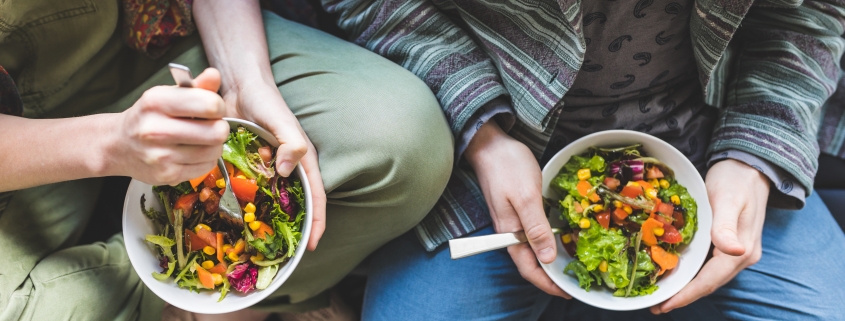When we think about getting clean and sober, we are likely to imagine treatment facilities, counselors, and twelve step meetings—each undoubtedly a significant part of recovery. Often overlooked is the vital roles diet and nutrition play in our ability to recover. Yet there is an impressive amount of research to back up the idea that our bodies, having often been severely malnourished while we drank and used to great excess, are far more likely to recover more fully and more quickly if reinvigorated by regularly eaten, nutritious food.
What our Bodies Endured While We Drank and Used
Some of us consumed drugs and drank to excess for many years, and in the process depleted our bodies and brains of the nutrients they needed to function properly. We may or may not have known about the physical and mental consequences of our behavior; nonetheless, our using and drinking behavior took its toll on us.
Research has shown that excessive alcohol use damages the body’s ability to absorb a whole host of micronutrients important to everything from forming nerve cells to building and strengthening bones. This happens because the intestinal lining, once damaged by alcohol, loses its ability to absorb the vitamins and minerals contained in the food we eat. Severe gastrointestinal and nervous system disorders can result from the vitamin and mineral deficiencies chronic alcohol use causes.
Drugs—both opiates and stimulants—also function by depleting the body and brain of crucial nutrients. While opiates can cause a range of gastrointestinal illnesses, drugs like meth and cocaine ravage the central nervous system. The result is that our brains and digestive tracts—areas of bodies responsible for producing mood-stabilizing chemicals like serotonin, dopamine, and norepinephrine—cease to function properly. These effects are particularly dangerous to those of us newly recovering from substance use disorder, since we are far more likely to turn to our drug of choice when our bodies cannot naturally manufacture the means for making us feel good.
Nutritious Food to the Rescue
On the bright side of the equation, much of damage we did to our bodies while active in our addiction is reversible—assuming that, as we recover, we choose to eat mainly nutritious foods that contain the macro- and micronutrients our bodies and brains so desperately need to heal. Additionally, the balance between “good” and “bad” bacteria in our guts that our drinking and using damaged will receive the help it requires through our improved eating habits.
Here are some excellent guidelines for what (and how) to eat and drink during the first few months of recovery:
- Eat breakfast daily. Before recovery, many of us skipped breakfast, but now we cannot afford to treat our bodies this way. Eating breakfast will jumpstart our metabolism; provide us with additional energy; balance our blood sugar levels, and help keep our hearts healthy. Protein, in the form of eggs, yoghurt, fresh fruit, and whole grains, are some of our best breakfast options.
- Drink water throughout each day. While our bodies are composed of about 60% water, our blood is around 90% water. Our bodies and brains need water to function properly, and regularly consuming water helps keep us hydrated while supporting everything from kidney function to the health of our skin.
- Eat fresh fruit and raw vegetables with each meal. By including these into your diet, you are likely to have lower blood pressure, a reduced risk of heart disease and stroke, have a lower risk of eye and digestive problems, and an improved blood sugar balance that may also help keep your appetite in check.
- Include beans, nuts, or seeds with every meal and snack on them between meals. These are great sources of good carbohydrates, healthy fats, protein, iron, and zinc—all key components to keeping your recovering body healthy.
Things to Limit or Eliminate from Your Diet
While active in our addiction, the pleasure centers in our brains became “hijacked”. Whenever we wanted to feel different, we immediately went to our drug of choice, essentially because our brains had over time become programmed this way. As we began to recover, our brains began to heal, but many of us continued to feel the effects of our hijacked brains. When we wanted to feel different, our minds hypnotically pulled us toward our drug of choice. This caused some of us to be more likely to relapse than we were later in our recovery.
Some of us found that we benefited from avoiding some of the foods and drinks that caused us to feel super stimulated, and/or which spiked our blood sugar. Such foods and drinks mimicked the ways our hijacked brains had behaved in active addiction—something we could ill afford in early recovery. We avoided sodas, energy drinks, sweetened beverages, fried foods, and sugary sweets. When we did choose to drink and eat these things, we were careful to avoid overconsumption.
If we made a choice to place the importance of our recovery above everything else, it made sense to us to help our recovering bodies and brains heal. This strengthened our recovery and helped us to feel better physically and mentally. Begin your recovery today by calling Burning Tree Ranch at 877-389-0500. A healthy and sober life awaits you!





